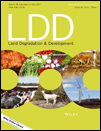 It’s been a mixed year for Wiley’s Land Degradation & Development.
It’s been a mixed year for Wiley’s Land Degradation & Development.
Following accusations of citation irregularities at the journal (whose its Impact Factor rose dramatically from 3.089 in 2014 to 8.145 in 2015), its editor was asked to resign. Another editor resigned shortly after.
But last week, Clarivate Analytics named the journal among the top 10 in the field of climate change, as part of its annual Journal Citation Reports.
The annual report also lists a number of journals that have been suppressed from Clarivate’s analysis “due to anomalous citation patterns;” Land Degradation & Development is not listed among the 13 journals this year.
A spokesperson for Clarivate told us:
News coverage about a particular journals does not influence Clarivate’s ranking decisions. This has never been the case.
She explained further why Clarivate’s method to detect citation irregularities didn’t flag Land Degradation & Development (LDD):
We indeed have established criteria used to address citation irregularities.
Some of the criteria was met for Land Degradation and Development but there are four criteria, and a journal must meet all of them. In the case of Land Degradation three out of the four were true for the 2015 JCR data and only two out of the four were true for the 2016 JCR data(technically this years 2017 release). Given the publisher’s response to this issue, we feel it is appropriate to stand by the outcome of the existing suppression methodology. We do reassess these criteria and their thresholds and will be taking this case into consideration for the 2018 JCR release.
That explanation didn’t cut it for publishing expert Phil Davis, who has tried to calculate why LDD wasn’t suppressed by previous Journal Citation Reports:
Given the editor’s work to artificially inflate LDD’s citation performance, I’m not surprised that LDD is now a high impact journal.
I am surprised that Clarivate wishes to feature LDD as one of the “world’s most influential journals.” Either Clarivate is completely unaware of how this journal rose to prominence or they don’t care. Either way, it’s quite disturbing.
By basing their suppression decisions entirely on threshold numbers, Clarivate has both legitimized unethical editorial behavior and described a clear roadmap for other unscrupulous editors to follow. This is going to do a lot of damage to their credibility.
Like Retraction Watch? Consider making a tax-deductible contribution to support our growth. You can also follow us on Twitter, like us on Facebook, add us to your RSS reader, sign up on our homepage for an email every time there’s a new post, or subscribe to our daily digest. Click here to review our Comments Policy. For a sneak peek at what we’re working on, click here.
Hi Alison
In the LDD webpage, they do not show their new IF… it’s very strange.